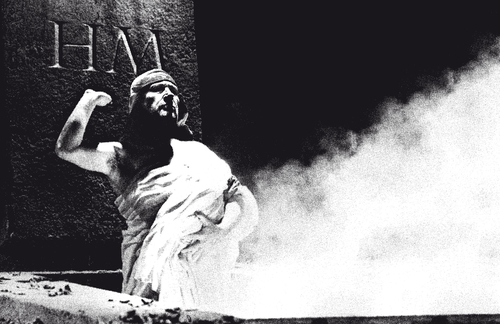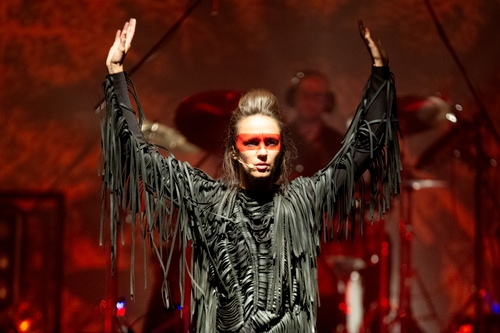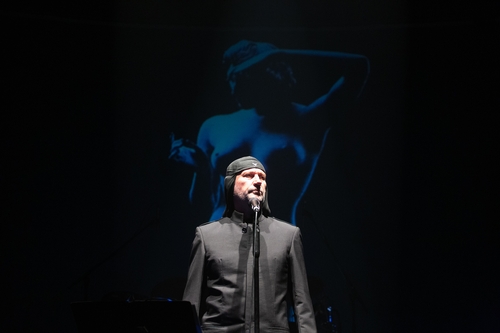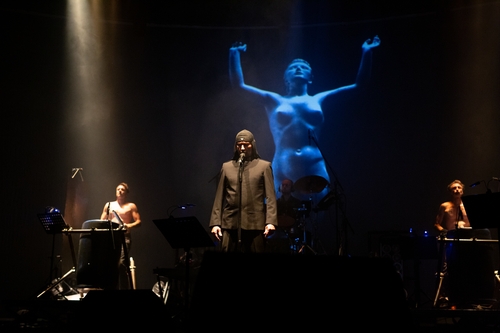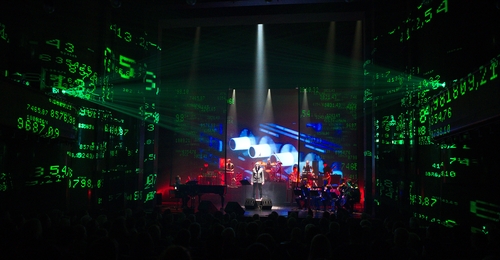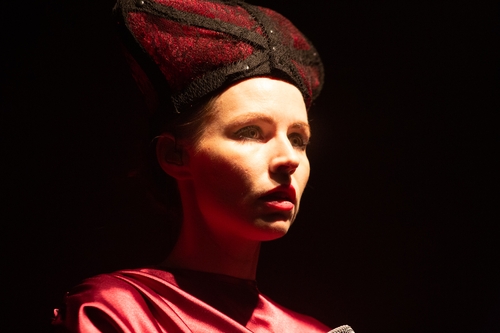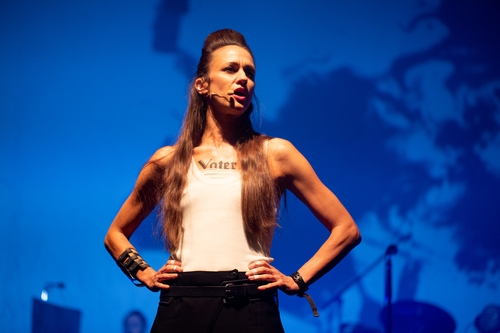Events
|
02.
April 2022.
Saturday at 8:00 p.m.
Main hall
|
LAIBACH
|
27.00 €
33.00 €
40.00 €
|
Tickets |
27.00 €
33.00 €
40.00 €
LAIBACH
WIR SIND DAS VOLK – Ein Musical aus Deutschland
(nach Texten von Heiner Müller)
When we hear the word Volk we reach for our guns. Laibach
Back in 1984, we composed music for Heiner Müller’s Quartet, a play that was presented at the Slovenian National Theatre in Ljubljana, directed by Slovenian director Eduard Miler. In February 1985, we coincidentally met Heiner Müller in Berlin and it turned out that he was very enthusiastic about Laibach and he also proposed that we collaborate on one of his upcoming theatre productions. Unfortunately, that did not happen (in the meantime we were invited by another legendary theatre and artistic director, intendant Peter Zadek, to work on Macbeth in 1987, which was staged at the Deutsche Schauspielhaus in Hamburg, directed by Wilfried Minks), but we were told that Heiner Müller had apparently used some of our music in a theatre production that he later worked on. A few years ago, in 2019, we finally received an invitation from Mrs. Anja Quickert, the head of Internationale Heiner Müller Gesellschaft, and she proposed a project, based on Heiner Müller’s texts, to be premiered and performed subsequently at the HAU (Hebbel am Ufer) Theatre in Berlin. The premiere of “Wir sind das Volk – Ein Musical nach Texten von Heiner Müller” was held on 8 February 2020, followed by two more shows on 9 and 10 February. The production was temporarily stopped due to Covid 19, but we managed to perform few more shows (Klagenfurt, Ljubljana…) also in 2021.
“As soon as the word ‘Volk’ (nation, people) appears, I become suspicious,” explained Heiner Müller in 1990. “This is not my nation. I understood very well why Brecht always insisted on the word ‘population, people’ instead of ‘nation’. Of course, such a slogan, ‘We are a people’, is useless, it doesn’t work at all.”The rallies that chanted “We are a nation” and established themselves as a political entity in 1989, at the time of the fall of the Berlin Wall, did not sound unjustified at the time. Since then, the term “Volk/nation” has undergone profound political changes – not only in Germany, but in Europe, the United States and the world. The ethnic potential of the “nation” was revealed again, making it an instrument of nationalist and racist exclusion. In a kind of global regression, populists (right-wing, but also left-wing) united in a phantasm of ethnic, cultural or religious homogeneity.
The project Wir sind das Volk – ein Musical aus Deutschland finally brings together what should have happened a long time ago: Laibach and the German playwright and poet Heiner Müller together. The myth of the nation cannot be buried as long as ghosts undermine its foundation. “Dialogue with the dead must not be interrupted until it is revealed which part of the future was buried with them.” Welcome to the abyss of the nation!
Anja Quickert
On composing the musical:
We’ve followed Heiner Müller’s own strategy of cutting and rearranging the material, taking his texts and putting it into another context, rebooting it with music, in order to drag the audience into it or alienate them from it. Another strategy was to follow a very cinematic approach, to act like this was not a theatre but film score; mixing music with sound design and classical elements like string quartet and piano with heavily modulated electronics, using a surround system, etc. Music unlocks the emotions and is therefore a great manipulative tool and a powerful propagandistic weapon. And that’s why a combination of Heiner Müller, who saw theatre as a political institution, and Laibach, can’t be nothing else but a musical.
Laibach
Press
Deutschlandfunk Kultur
A finale that leaves the audience finally in raptures.
Freitag
... a contemporary artistic intervention, since at present many (...) are again calling for a renaissance of the völkisch.
Berliner Zeitung
But any Müller text ... in its powerful fragility explodes any bombast on its own.
A merciless ride through the fantasy of being German, which only produces foreignness and breaks identities.
Tagesspiegel
(...) and Laibach once again sounds like the smarter edition of Rammstein.
taz
But the remarkable production of director Anja Quickert and the Slovenian artists delivers an important insight: that it is very German to think Germans are always the others.



